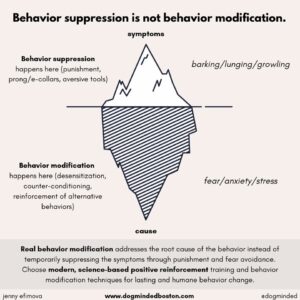Barks Blog
Behavior Suppression Is Not the Same as Behavior Modification
By Jenny Efimova

Reactive behavior is the tip of the iceberg. It’s what we see: the lunging, the barking, the snarling, the growling, etc. It’s what’s above the surface and it’s what we often want to stop. What we don’t see and what’s driving this behavior is the rest of the iceberg below: the fear, the anxiety, the stress, the frustration. So if we want the behavior to change, we need to look at the root cause, not just the symptoms.
When we change how a dog feels about a trigger, we help change how they act around it. We do this through the application of modern, science-based positive reinforcement behavior modification techniques including desensitization, counter-conditioning, and reinforcement of alternative behaviors.
What we don’t do to change how a dog feels about a trigger is use punishment and aversive tools such as prong or shock collars. No matter how these tools are marketed, packaged, and sold to us, and no matter how “properly” or “correctly” we use them, they work by means of pain and fear avoidance. They “work” by stopping the behaviors we see—the barking, the lunging, the growling. They “work” by temporarily suppressing these behaviors. They “work” by addressing the symptoms not the cause. They “work” by trying to chip away at the tip of the iceberg. But even if the entire tip is gone, the mammoth below remains.
What also remain are the countless risks associated with the use of pain-based tools including increased fear, anxiety, stress, avoidance, aggression, and behavioral shutdown.
The year is 2019, folks. Let’s get real. Don’t mistake behavior suppression for behavior modification. If your dog needs help, hire a reputable professional who understands the science of behavior and has the education, skillset, and experience (yes, those matter!) to create real, lasting, and humane behavior change.
About the Author
